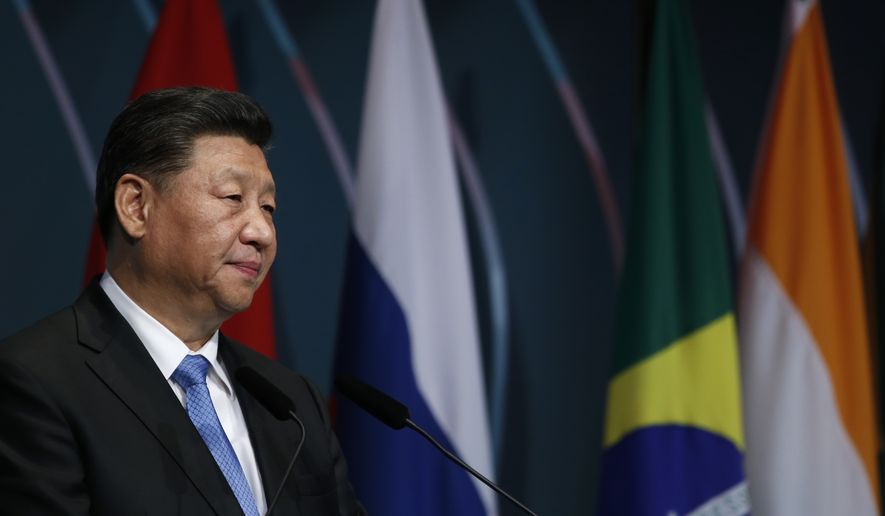OPINION:
’How to Lose Friends and Alienate People” is not just the name of the English journalist Toby Young’s memoir. It’s also an apt description of Chinese foreign policy under President Xi Jinping.
China has only one official treaty ally and it’s not necessarily one you would want as a friend: North Korea. It also maintains close ties with Pakistan, though the two are not bound by treaty.
But in the early part of this century, back when Beijing spoke incessantly of pursuing a “peaceful rise,” it did a good job of fostering closer relations with multiple foreign powers. It built deep economic networks across Southeast Asia, Africa, and even South America, hardly Beijing’s backyard. The advent of pricey soft-power initiatives like “Confucius Institutes” — the hundreds of schools within schools set up across universities and high schools worldwide to promote a Beijing-friendly worldview — demonstrated that Beijing was serious about influencing global opinion not just through televised parades of goose-stepping soldiers and ICBMs, but also happier times like dumpling-making classes and Mandarin lessons.
Under Mr. Xi, who has been in office since 2012, things have changed. Mr. Xi embarked on a ferocious crackdown domestically, quashing dissent and stressing party discipline — on a recent trip to Beijing, a middle-ranking Communist Party member showed me the 20 minute lesson on “Xi Jinping thought” that is zapped to his smartphone every morning that is mandatory that he complete. And abroad, China’s bellicose foreign policy — threatening Taiwan; expanding its reach in the South China Sea; punishing neighboring democracies like South Korea for taking decisions that don’t meet its approval — have badly hurt China’s image.
According to a Pew Research Center poll from earlier this year, China has grown deeply unpopular among its neighbors and Western democracies. Eighty-five percent of Japanese have a negative view of China. So do 63% of South Koreans, 57% of Australians, and 54% of Filipinos. Seventy percent of Swedes have a negative view of China, as do 62% of the French, 58% of the Dutch, and 57% of Italians. In Canada, meanwhile, China is viewed negatively by fully two-thirds of the population.
Perhaps needless to say, Beijing is not exactly popular in Hong Kong these days either. And while technically the capitalist entrepot is not a “foreign policy” issue for Beijing, Hong Kong is of course a distinct administrative region, governed separately from the mainland.
The U.S. is no exception to this global trend. Sixty percent of Americans take a dim view of China, and Beijing is now woefully unpopular across the entire political spectrum.
The multiple Democrats vying to replace President Trump attack him for just about everything — his immigration policies, the tax cuts he signed, his deregulatory agenda, the hue of his skin, his taste in food, and his, uh, keen interest in obscure Ukrainian gas companies. But what have they remained silent on? The president’s ongoing, and escalating trade war with China. The news website Axios noted earlier this year that the Democratic contenders had “punted” on the subject: “None of the leading Democratic presidential contenders said they would immediately drop President Trump’s tariffs on China if elected president,” Axios wrote.
What subject could possibly unite fire-breathing Texas Republican Sen. Ted Cruz and socialist New York Rep. Alexandria Ocasio-Cortez (besides, perhaps, their love of Twitter)? China.
During the recent dust-up between Beijing and the National Basketball Association, Mr. Cruz and Ms. Ocasio-Cortez both signed a bipartisan letter lamenting that the “Chinese Communist Party is using its economic power to suppress the speech of Americans inside the United States.”
“It is also outrageous that the NBA has caved to Chinese government demands for contrition,” they continued.
China’s heinous mistreatment of its Muslim Uighur minority has also drawn bipartisan condemnation. Sen. Marco Rubio, the Florida Republican, sponsored the “Uighur Human Rights Act of 2019,” which passed the chamber easily. And then over the weekend, Sen. Elizabeth Warren, the progressive Massachusetts Democrat, tweeted that “The Chinese government’s cruel, bigoted treatment of Muslims and ethnic minorities is a horrifying human rights violation.”
Beijing still uses its economic might in its near abroad to stifle condemnation — in a briefing with The Washington Times earlier this fall, Pakistan’s ambassador to the United States declined to comment on China’s maltreatment of its Muslim minority, while simultaneously speaking passionately about India’s maltreatment of its own Muslim population — but it’s undeniable that President Xi has presided over a marked decline in his country’s image abroad.
It’s become something of a truism that the reason that domestic U.S. politics have become so vicious is that, after the dissolution of the Soviet Union, we lost a common enemy to rally together against. If present trends regarding China continue, it might not be long until Democrats and Republicans are singing “Kumbaya” together once again.
• Ethan Epstein is deputy opinion editor of The Washington Times. Contact him at eepstein@washingtontimes.com or on Twitter @ethanepstiiiine.




Please read our comment policy before commenting.